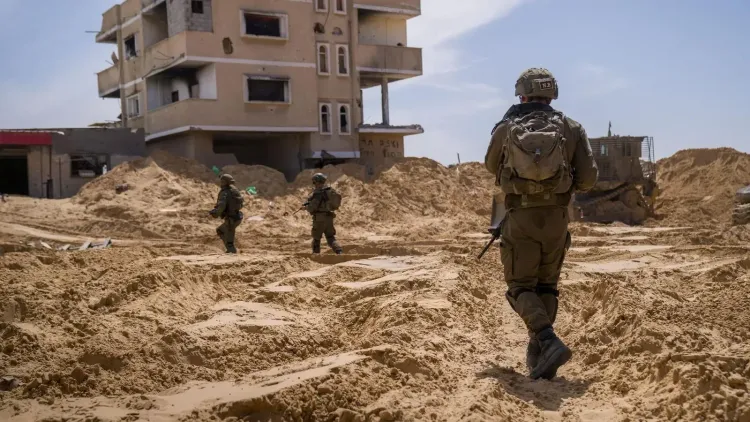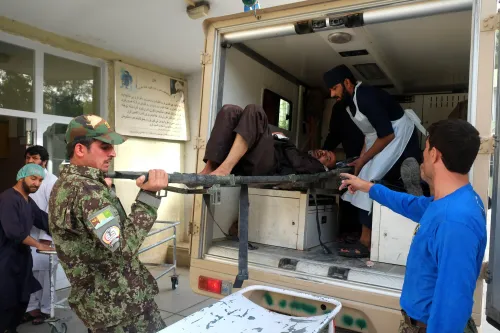Israeli Forces to Maintain Presence in Gaza, Lebanon, and Syria Indefinitely: Defence Minister

Synopsis
Key Takeaways
- Israeli troops will remain in Gaza, Lebanon, and Syria indefinitely.
- Israeli airstrikes have resulted in significant civilian casualties.
- Negotiations for a ceasefire with Hamas are complicated by military actions.
- Humanitarian conditions in Gaza are deteriorating rapidly.
- Political tensions remain high between Israel, Lebanon, and Palestinian factions.
Jerusalem, April 17 (NationPress) The Defence Minister of Israel has announced that military personnel will stay in designated security zones within the Gaza Strip, Lebanon, and Syria indefinitely, comments that could further complicate negotiations with Hamas regarding a ceasefire and the release of hostages.
In the meantime, airstrikes across Gaza have resulted in the deaths of an additional 22 individuals, as reported by local health officials.
Israeli forces have captured over half of Gaza in an intensified effort to compel Hamas militants to free hostages after Israel ended its ceasefire last month.
Israel has also declined to withdraw from certain regions in Lebanon following a ceasefire with the Hezbollah militant organization last year and has established a buffer zone in southern Syria after rebels ousted Syrian President Bashar Assad in December.
"In contrast to previous actions, the Israeli military is not retracting areas that have been cleared and taken," stated Defence Minister Israel Katz.
The military "will persist in the security zones as a barrier between the enemy and Israeli communities in any temporary or permanent situation in Gaza — similar to the situation in Lebanon and Syria".
The Palestinians, along with both neighboring nations, regard the presence of Israeli troops as military occupation, which they claim violates international law.
Lebanese President Joseph Aoun remarked that Israel's ongoing presence in certain Lebanese territories is "impeding" the Lebanese army's complete deployment as mandated by the ceasefire agreement with Israel.
On Wednesday, two Israeli drone strikes in southern Lebanon resulted in two fatalities, according to the Health Ministry.
The UN has reported that Israeli airstrikes in Lebanon have led to over 70 civilian deaths since the ceasefire commenced in November.
Hamas has declared that it will not release the remaining hostages without a full Israeli withdrawal from Gaza and a lasting ceasefire.
"They assured us that the hostages would be prioritized. In reality, Israel is opting to seize territory before addressing the hostages," stated the primary organization representing the families of the hostages.
"A singular solution exists that is both desirable and feasible, which is the simultaneous release of all hostages as part of an agreement, even if it means concluding the war."
Israel contends that it must maintain control over what it designates as security zones to avert a recurrence of Hamas' attack on October 7, 2023, when thousands of militants invaded southern Israel from Gaza, resulting in nearly 1,200 deaths, predominantly civilians, and the abduction of 251 individuals.
According to Gaza's Health Ministry, Israel's offensive has led to the deaths of over 51,000 Palestinians, although the ministry does not specify how many were civilians or combatants but indicates that women and children constitute more than half of the deceased.
Israel claims it has eliminated approximately 20,000 militants, although it has not provided supporting evidence.
Israel asserts that it exclusively targets militants and assigns blame to Hamas for civilian casualties due to its fighters operating within residential areas.
Israeli bombardments and ground operations have rendered vast regions of the territory uninhabitable and displaced around 90 percent of Gaza's nearly two million Palestinian population. Many have been displaced several times.
Hundreds of thousands are crammed into overcrowded tent camps, facing dwindling food supplies as the aid blockade imposed by Israel in Gaza enters its seventh week.
The UN humanitarian office, or OCHA, reported on Wednesday that humanitarian workers in the field are observing an increase in acute malnutrition throughout the Gaza Strip.
Israeli Prime Minister Benjamin Netanyahu has pledged to eliminate Hamas and to secure the return of the 59 hostages still in Gaza — 24 of whom are believed to be alive.
On Wednesday, the Palestinian Islamic Jihad militant group released a video featuring hostage Rom Braslavski. This was the first indication of life from him, although previously released hostages had mentioned seeing him in captivity. In the video, which appeared to be recorded under pressure, Braslavski described dire conditions of his captivity and implored Netanyahu to cease hostilities and permit humanitarian aid into Gaza.
Netanyahu has also indicated that Israel will consider implementing US President Donald Trump's proposal for relocating a significant portion of Gaza's population to other countries through what he calls "voluntary emigration".
Palestinians and Arab nations have unanimously rejected Trump's proposal, which human rights advocates assert may contravene international law. Residents of Gaza express that they do not wish to leave and fear another mass expulsion akin to the one during the conflict surrounding Israel's formation in 1948.
The Trump administration, which has taken credit for facilitating the ceasefire, has voiced strong support for Israel's decision to terminate the truce and suspend aid.
Trump's Middle East envoy, Steve Witkoff, has been attempting to negotiate a new ceasefire that is more advantageous to Israel; however, these efforts seem to have made minimal progress.









